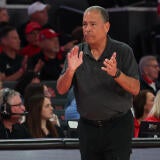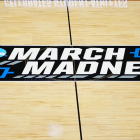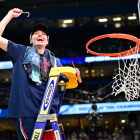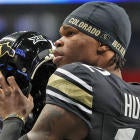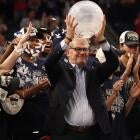LEXINGTON, Ky. -- After his team had beaten Bucknell on Thursday, Butler coach Brad Stevens let something slip in his postgame press conference. He said it like it was nothing, because to him it was nothing. When I told him Friday that the media in attendance couldn't stop talking about what had happened, Stevens was stunned.
"That?" he said. "I was afraid I was boring everyone. Nobody wants to hear that."
| More on NCAA Tournament |
| Related links |
|
| More college basketball coverage |
Wrong. When have you ever seen Brad Stevens make a mistake in March? There it is. Right there. Thinking that little nugget of information after the Bucknell game was nothing, boring, irrelevant.
Butler had just won 68-56, and Stevens was talking about the preparation that had gone into playing such a unique team in the NCAA tournament opener. He was trying to explain that Bucknell's triangle-and-two defense initially threw off his team because they hadn't prepared for it. Stevens knew that particular junk defense might come because he'd seen Bucknell do it to other teams this season, but he was saying you can't prepare for everything. So you go with the odds.
"What do you spend your time on?" Stevens had asked rhetorically. "Do you spend your time preparing for their offensive stuff, do you prepare for their defensive stuff, or do you prepare for something they probably played 30 possessions all year?"
And with that, he had won the press conference. Drop the mic, Brad Stevens. The press conference is over.
Probably 30 possessions? That's how many times Bucknell had played a triangle-and-two defense this season? Bucknell had played 33 games before the NCAA tournament opener. The median number of possessions for each team in a game is 66, so do the math. Bucknell had played maybe 2,000 defensive possessions all season, and Stevens had a rough idea how many times -- how few times -- the Bison had played a specific defense. Maybe 30 times in a season of 2,000 possessions.
Oh, and he knew how the Bucknell sideline called for that specific defense.
"Double fist," Stevens said.
Just leave. Drop the mic and go.
But listen, Stevens wasn't bragging. Understand that. He wasn't showing how smart he was or how hard his staff had been working or anything like that. He was explaining why his team had struggled so badly during a period of that game, when Bucknell made a 19-2 run to turn a big deficit into a 37-31 lead with less than 10 minutes to play. Bucknell had used the triangle-and-two defense to spark the run. The media wondered what had happened. Well, there you go.
That was Stevens' Rain Man moment. And it was my eureka moment, because I'll be honest: Until that explanation at that press conference, I didn't understand why the 36-year-old Stevens was so exceptional. You can look at his record at Butler -- at his NCAA-record 166 wins in six years, at his back-to-back appearances in the national title game -- and get a good idea that he is exceptional. I'm not saying you can't. But why is he so good? Why is he better than all those other coaches with so much experience and X-and-O knowledge?
That's why. Those 30 possessions by Bucknell. That double fist. That preparation.
Buzz Williams of Marquette didn't know that story but he volunteered one of his own Thursday, after Marquette had beaten Davidson to advance into the next round opposite Butler. "Coach Stevens is a genius," Williams said. That was Thursday. On Friday he went a step farther, if you can believe it.
"Coach Stevens is a Hall of Fame coach," Williams said. "He's just not old enough for you to call him that yet."
Williams also offered a small explanation for why -- nothing definitive but another cool little glimpse behind the coaching curtain.
"Brad Stevens is not 12-4 in the NCAA tournament because he coaches the same team in March that he coaches in November," Williams said Friday, a day after he had predicted something almost eerie.
"I would say 24 hours from now," Williams had said Thursday, "when I talk to you again, [Butler will be] a completely different team because they're going to get better."
Butler wins because of its composure and attention to detail, two things that come straight from the top. One of the most memorable moments of the season was the Butler-Gonzaga finish, when Gonzaga was winning by a point and Butler's Roosevelt Jones stole the ball and was about to shoot a runner at the buzzer and Stevens started walking toward the Gonzaga bench. Whatever happened with the shot, the game was about to end. Stevens knew it, and he knew he had somewhere to be, so he crossed his arms and was several steps toward Zags coach Mark Few when Jones' shot dropped through the net and Hinkle Fieldhouse exploded in noise and Butler's players sprinted around the court and Stevens kept walking, calmly, to shake Few's hand.
"I think the outcome is irrelevant if he thinks we played as well as we possibly could," said Butler guard Rotnei Clarke.
Stevens doesn't get rattled. Nor does his team. Butler responded to Bucknell's 19-2 run with a 22-5 run of its own. It was a microcosm of a two-game swing earlier in the season when Stevens realized he had a special team on his hands. It happened in early March, when Butler was blown out 84-52 by VCU but won five days later at UMass 73-62.
"That was kind of a telltale moment for me that this is a pretty darn good basketball team," Stevens said.
That's the bigger picture. Smaller scale, how does Stevens do it? I've been asking everyone here at Lexington, from Stevens' players to opposing coaches and players, and all say the same thing: Stevens' attention to detail is staggering. It's that 30-possession Bucknell story, over and over.
Butler center Andrew Smith described Selection Sunday, when Butler learned it had drawn Bucknell. The players met the media for maybe 15 minutes, then reconvened in private in the locker room -- where Stevens was waiting.
"I've already watched 20 clips of Bucknell's defense," Stevens told the team.
Said Smith: "We all just started laughing."
They aren't laughing in the Marquette locker room, where Buzz Williams is convinced the Butler that shows up Saturday won't be terribly similar to the Butler that beat Bucknell on Thursday. And they weren't laughing over at Bucknell, where coach Dave Paulsen noticed something as he studied Butler before the game.
"If I wasn't having to prepare to play against Butler, this would be an unbelievable experience because it's like a clinic," Paulsen said. "I've gone through seven, eight game tapes of Butler. It's the best coaching clinic you can have. Their attention to detail, their execution defensively and offensively, is textbook."
This is why Butler wins. And it's why other schools want Stevens. He didn't want to tell me how many schools had inquired about hiring him away from Butler in recent years, finally settling on "somewhere in the teens" when it was clear I wasn't going away. But Stevens tried to explain that away.
"You have to understand," Stevens told me, "a lot of this is, 'If you were one of four or five coaches we had an interest in, would you be interested ...'"
Stop, I told Stevens. Just stop. You're very good, and while the non-basketball savants in the media might not understand exactly why, we understand a genius when we see it. We saw Rain Man. That dude knows the number of toothpicks on the floor. Stevens knows the number of triangle-and-two defensive possessions run by Bucknell.
As for me, I know Stevens doesn't have to leave Butler to coach in a big conference. He's so good, see, the big conference came to him. Butler is joining the Catholic Seven in the reconfigured, smaller but still powerful Big East, and when that move happens, it will happen for one reason. That reason is not Butler's mission as a small, private school.
The reason is Brad Stevens. Of course he's a very good driver.
![[object Object] Logo](https://sportshub.cbsistatic.com/i/2020/04/22/e9ceb731-8b3f-4c60-98fe-090ab66a2997/screen-shot-2020-04-22-at-11-04-56-am.png)







